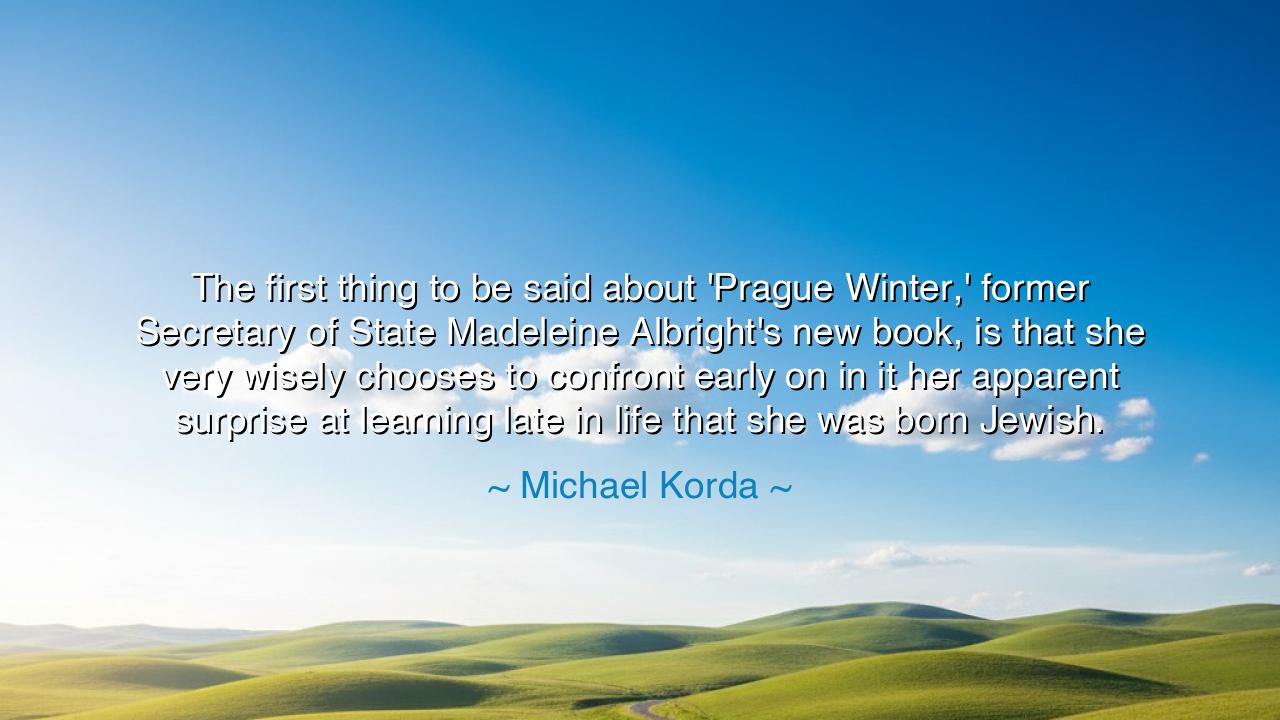
The first thing to be said about 'Prague Winter,' former
The first thing to be said about 'Prague Winter,' former Secretary of State Madeleine Albright's new book, is that she very wisely chooses to confront early on in it her apparent surprise at learning late in life that she was born Jewish.






The words of Michael Korda—“The first thing to be said about ‘Prague Winter,’ former Secretary of State Madeleine Albright’s new book, is that she very wisely chooses to confront early on in it her apparent surprise at learning late in life that she was born Jewish.”—speak not only of literature, but of identity, truth, and the quiet courage of self-revelation. In this reflection, Korda touches upon something deeper than biography: the ancient and timeless journey of a soul coming face to face with its forgotten origins. His words remind us that history does not belong only to nations—it dwells within the blood and bones of every human being. And to uncover that history, even late in life, is to undertake a kind of spiritual awakening.
The origin of this quote lies in Korda’s review of Madeleine Albright’s memoir Prague Winter, in which she recounts her childhood during World War II, her family’s exile from Czechoslovakia, and her discovery—decades later—that she had been born into a Jewish family that concealed its identity to escape persecution. For Albright, one of America’s most influential diplomats, this revelation was not a scandal but a sorrow—a window suddenly opened onto generations of silence and survival. Korda, in observing how she addresses this discovery “early on,” praises her for choosing honesty over evasion, clarity over concealment. In doing so, he acknowledges that confronting one’s truth, especially one rooted in suffering, is an act of wisdom and grace.
To the ancients, such an act would have been seen as a form of initiation. The Delphic Oracle’s command, “Know thyself,” was not a mere proverb but a divine imperative. Self-knowledge, especially when it uncovers pain or contradiction, was considered the first step toward enlightenment. Albright’s revelation mirrors this ancient teaching: it is not enough to master the affairs of nations if one remains a stranger to one’s own soul. Through Korda’s lens, her story becomes a modern parable about the necessity of remembrance—that we cannot escape what we are, and that truth, once revealed, seeks to heal what silence has wounded.
History is filled with echoes of such rediscoveries. One might recall the philosopher Spinoza, born into the Jewish community of Amsterdam, who was later exiled by it—only for his writings to become one of Judaism’s most profound contributions to the world. Or consider the countless survivors of Europe’s Holocaust who, in their later years, unearthed family histories hidden beneath decades of fear. Their revelations, like Albright’s, speak not merely of identity but of the resilience of truth, which waits patiently beneath the dust of time until it is called forth. Korda’s reflection on this moment captures that sacred inevitability: that no matter how far one travels, one’s origins remain a compass, quietly pointing home.
Korda’s praise for Albright’s courage to confront her discovery “early on” also holds a lesson in humility. Many in power fear vulnerability, yet Albright understood that leadership built on denial is fragile. By acknowledging her hidden heritage, she transcended the boundary between the personal and the political, reminding the world that even the most powerful are shaped by histories beyond their control. This act transforms her from a stateswoman into a teacher of truth—one who shows that acknowledging what we did not know about ourselves is not weakness, but rebirth.
The emotional power of this story lies in the paradox of learning late what was always true. In every life, there are secrets—some imposed, some chosen—that shape our understanding of who we are. But as Korda’s observation suggests, there is dignity in uncovering them, in facing the mirror unflinchingly. For to hide from one’s truth is to remain divided within; to embrace it is to achieve wholeness. Albright’s journey, and Korda’s recognition of it, become a testament to the idea that identity is not fixed but unfolding, that we are each, in our own way, writing the story of rediscovery.
The lesson, then, is eternal: never fear the uncovering of truth, for truth is the soil in which wisdom grows. The past, however painful, is not our enemy but our teacher. Let Albright’s example and Korda’s insight remind us that to confront who we are—even when that truth surprises or unsettles us—is to live authentically. In the end, self-knowledge is not about what we learn, but what we become by learning.
Thus, Korda’s simple observation becomes a meditation on the deepest human journey. It tells us that identity is not always inherited; sometimes it must be reclaimed. And when it is, the act becomes not only personal, but sacred—a reconciliation between the self we have lived and the self that has been waiting, quietly, through all the winters of our forgetting.






AAdministratorAdministrator
Welcome, honored guests. Please leave a comment, we will respond soon